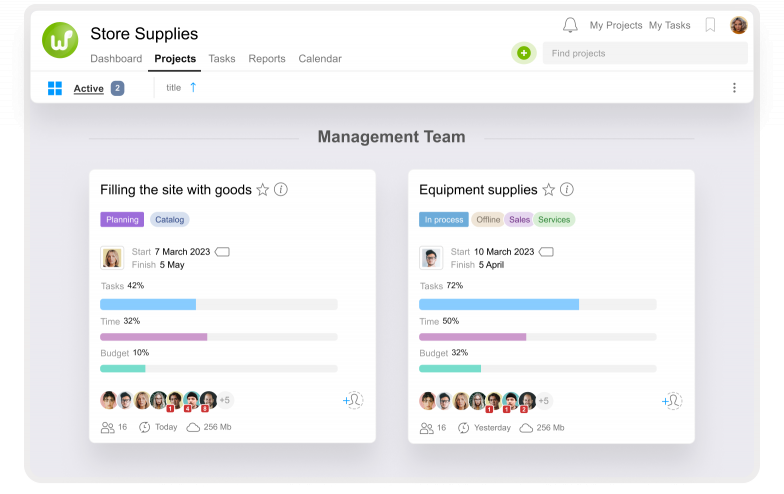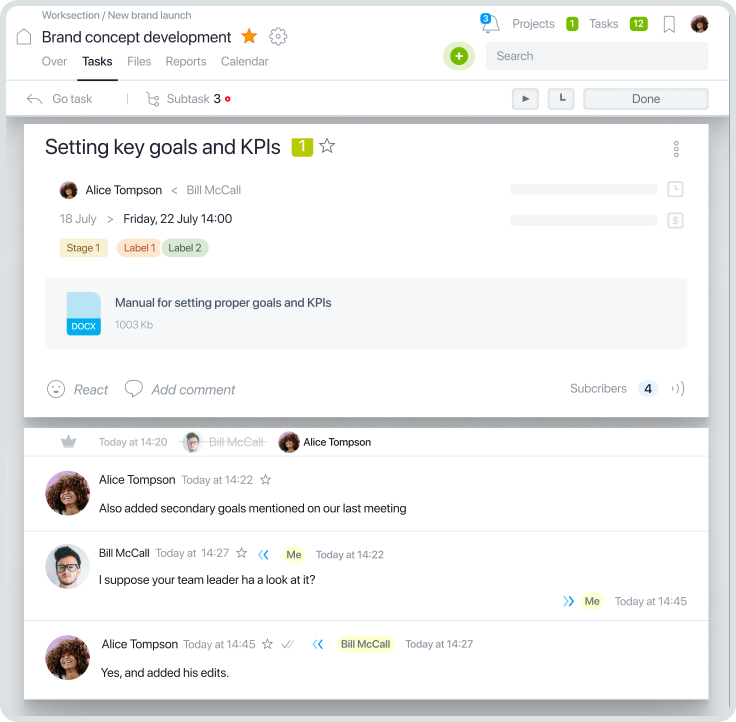Do you want to reduce costs, work stably, improve the quality and efficiency of the team’s work, and also increase the level of satisfaction of customers and partners? Then you definitely realize the importance of project management and the role of project manager in the company.
If you are still thinking about whether it is worth implementing such a management format in your business, this information will help you understand the issues in more detail.
Why is Project Management Important?
Companies that invest time and money in integrating the best project management practices into their processes ultimately see measurable results. These enterprises are actually successful. This opinion is confirmed by a number of studies.
For example, in 2021, PMI and PwC conducted a survey with 4,069 respondents. It showed that 80% of projects that are recognized as really effective have a certified project manager.

Besides, the use of project management methodology increases the probability of success. According to PwC, approximately 77% of respondents with successful projects report documented management processes. At the same time, companies that do not use project management say that their projects are less successful.
The same investigation of PwC demonstrates that in organizations that are mature in terms of building management processes, more than 90% of project managers are certified. On the other hand, only 61% of such employees are in companies that are still undergoing the process of formation.
Organizations that do not pay much attention to project management waste approximately 12% of their resources.
So, companies that intend to gain leadership positions in their market definitely need project management. To finally make sure of all the benefits, let’s think of the advantages provided by the use of project management and why management is important.
Business Growing Advantages of Project Management
Below are the benefits of project management implementation.
Multiple project management
Practice shows that 85% of project managers got used to working with several projects at the same time, only 15% of them manage only one project. After all, in today’s highly competitive market, companies can often remain profitable only in this way.
Some of the managers may have five projects in progress, while others successfully manage ten. Of course, a lot depends on the complexity of the tasks and the size of the team. But in any case, the project manager needs to keep a lot of tasks in focus.

So to avoid burnout and make a minimum of mistakes, it is worth using not only management methodologies, but also a task manager. It will allow you to keep all the key information in one place, and quickly analyze the current state of each of the projects.
We wrote more about effective multiple project management here.
Quick financial growth
Statistics demonstrate that companies with agile management methodologies increase their revenues 37% faster than those who refuse such an approach. In addition, agile organizations are approximately 30% more profitable than inflexible competitors.
To use this benefit of project management it is necessary to
- choose a methodology, which ultimately suits your business;
- have tools of financial management (any specialized service or a module in a task manager).
Better quality of products and services
The goal of each project is making a product. So, 44% of companies that work using project management confirm that the quality of their product is higher than those that do without this management format.

This is largely possible due to progress and error tracking systems. After project completion the data from these services are collected, systematized and analyzed. As a result, you can notice common mistakes and avoid them in the future. You can also see the best practices at once. Therefore, they become the basis of work on the company’s future projects.
Saving time
It is known that the project management system offers managers the opportunity to work in less time.
On average it is not much, just ten minutes a day. But during the year it is about 153 hours or 19 working days. Not bad, right?
This time is saved because project management methodologies traditionally prescribe the use of services: task managers, time trackers, etc. These tools offer automation of many routine actions and you get the information you need faster.
The degree of predictability is increasing
One of the basic things in the project management process is planning. When all components of work are carefully worked out, it is possible to understand at the initial stage whether the project will be successful.
It is also possible to predict probable risks in advance and decide how to manage them. Therefore, the probability of an unpredictable event is very small.
In order for everything to work as it should, you need to systematically work according to the principles of the chosen methodology and clearly perform all the actions provided for the project life cycle. That is: if in one project everything is done according to the rules from the initiation phase to the completion phase, then in the next one you will have less unpredictable items.
Reducing stress and burnout of employees
When employees have to constantly keep a lot of things in mind, solve tasks without relying on a previous experience, and also have problems with communications — a constant stress, and over time, burnout — is guaranteed.

If you follow the principles of project management and use the appropriate tools, you can reduce these negative phenomena. After all, the tasks will be collected in the task manager, the documentation with the team’s previous experience can be easily found in the corporate knowledge base, and the main communications can be conducted in the messenger integrated with a task manager.
Optimizing the use of resources
You have definitely faced the fact that working time is less than tasks that need to be solved. Unfortunately, almost everyone has this experience. But teams that work with project managers and task trackers usually face this less often. Why?
Because all the tasks are fixed, they have priority levels, and there are also time standards for completing certain tasks.Accordingly, the project manager, for example, sees that someone has an overloaded list of tasks, and all tasks have a high priority while someone else in the same period has only tasks that are not difficult and not very urgent. So, he can redistribute tasks, making workload more adequate.
Reducing the risk of bankruptcy
Statistics state, projects with an investment of more than $1,000,000 fail 50% more often than those with a budget of up to $350,000. It is clear that such an epic mistake can end in complete financial collapse.
Therefore, project management is important for those who work with expensive projects. After all, as we indicated above, companies in which project management is carried out by professionals are generally more successful.
Better team communications
Above we mentioned the importance of communications, because it sometimes becomes a real challenge in project management. In fact, this problem can only be solved by following the principles of the chosen methodology.
To improve team communication, you can use task trackers with a built-in chat and/or integration with popular messengers. In this way, you avoid the problem of lost messages and unnoticed tasks.

Increasing the effectiveness of leaders
A true leader should always be aware of the affairs of the company as a whole, as well as certain projects. When all teams work within the approved standards, it is easier for the manager to get an overview of what is happening. All teams have the same standard of documentation, task setting regulations, KPI, etc.
Task managers, which have Gantt charts, dashboards, etc., also simplify the manager’s work. That is, tools that allow you to literally see the main indicators for each project on one screen.
Increasing transparency of processes and roles in teams
Often team members do not understand each others’ responsibilities even within their own division, nothing to speak about other departments and top managers. At the same time, about 38% of organizations believe that this uncertainty is one of the main obstacles to project success.
High-quality project management is based on maximum transparency, when everyone can see, for example, in the task manager, which tasks his colleague or direct manager is responsible for. When work is structured in this way, it is much easier for people to ask for help, delegate tasks and go to success together.

More attention to strategic tasks
Project management assumes that many routine tasks are automated and processes are standardized. That is, both employees and managers can have more time for the strategic tasks.
This approach results in growth and expansion of the company.
Good understanding of goals and progress
As mentioned above, it is important for leaders to quickly assess the state of affairs in the company. But it is no less important for other employees. Having clearly defined goals is really motivating. Besides, when everyone sees how much they have already done, for example, from a monthly or a weekly plan, it becomes easier to move on.
Therefore, when managing projects, it is worth having the visual display of goals and the amount of work that the team has already completed. Here, again, charts, scales, performance graphs, etc. are of great help.

Considered decision-making
When decisions are made intuitively, it usually leads to unpredictable consequences. Therefore, much attention is paid to the gathering and structuring of information in project management. Based on it, you can make balanced, reasonable and effective decisions.
Simple reporting
Having a single standard for working with information for the entire company, it is much easier to gather it and make it into a report. Besides, there are tools that automatically download certain data in the format of graphs and tables. That is, you don’t even need to spend time converting numbers into graphics.
This is especially useful when the team works in an hourly payment format. Then it is enough for each specialist to record the time spent on solving tasks every day. At the end of the month, you can download a ready-made report, where the time for the projects will already be calculated.
Effective management of work volumes
It happens that the company has a potential client who would like to order certain services. But the management is not clear whether the existing staff will be enough or new employees must be hired.
This happens in companies with no project management. If it exists, then the amount of work and workload distribution among employees is easy to estimate.
Accordingly, it is also easy to understand how to deal with an additional workload. For example, if you have five employees, each working 40 hours a week and fully loaded, you should not take an order for 20 additional hours and expect to fulfill it with the available forces.
But, let’s repeat, you can understand this, if you record time and employees’ workload.
Quick adaptation of new employees
With a well-established project management system, you can train new team members faster, because a large part of the processes is described.

Besides, the experience of working with certain requests has already been accumulated, so a new person will not have to invent on his own what someone already knows. It is enough to ask colleagues and study the information received.
Greater satisfaction of all participants
It is clear that customers are happy when their order is fulfilled on time (or ahead of schedule), without cost overruns and serious defects. Likewise, the team is satisfied with everything going according to plan, without disruptions and work to exhaustion.
This is what all project management methodologies are aimed at and, as practice shows, their use makes it possible to achieve overall satisfaction.
Increasing the attractiveness of the company for partners and customers
Generally, people want to work with those who are stable, efficient and predictable. Companies with implemented project management are just like that. Therefore, they will always have advantages over competitors and attract partners with the same values.
Easy scaling
Companies that work with project management principles from the very beginning scale faster and more efficiently, because the management already knows about the best practices that help achieve results. Therefore, when new teams, departments and areas of activity appear in the company, their work is automatically built in the best way.
How do you determine the value of project management for the company?
Now you know why project management is important for companies and what specific advantages it offers. But there can be difficulties with the question of measuring value. After all, really high-quality project management works so organically that it seems as if all processes happen by themselves.
Therefore, the real value of project management is often noticed when there is an opportunity to compare. That is, to see what happens when there is no project management, namely:
- releases do not come out on time;
- work schedule is violated;
- budgets are exceeded.
